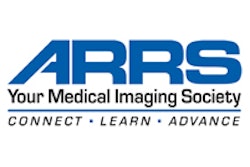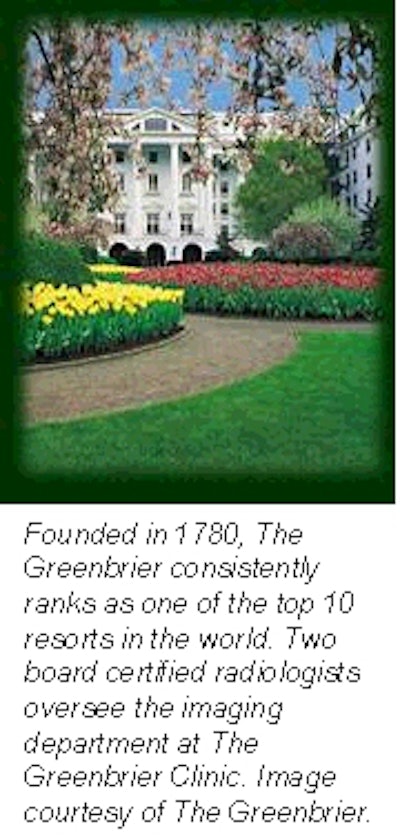
To promoters, they're an easy way to take charge of one's own health. To detractors, they're a moneymaking scheme with dangerous implications. Either way, healthy adults are flocking to boutique clinics for full-body CT scans, hoping to detect medical problems before symptoms appear. The scans aren't cheap -- the worried-well spend up to $1,500 of their own money to buy what some say is of little practical use.
In the medical imaging community, opponents of the so-called "yuppie scans" say the procedures are a waste of money, create a false sense of security, and can lead to unnecessary tests and invasive procedures. Moreover, the benefits are unproven, and any lifesaving discoveries that might turn up are simply too rare to offset the money being spent, say critics.
"The concept of discovering unsuspected, preclinical disease, and thereby curing these 'patients' of their disease before it turns into an aggressive, possibly fatal disease is an intuitively compelling notion," said Dr. Robert Stanley, president of the American Roentgen Ray Society (ARRS). "However, as clinical epidemiologists and others who have researched the concept of screening will tell you, the concept is a spurious and deceptive one."
The American College of Radiology (ACR) issued a statement in September 2000 cautioning that "there is no evidence that total-body CT screening is cost-effective or is effective in prolonging life. In addition, the ACR is concerned that this procedure will lead to the discovery of numerous findings that will not ultimately affect patients' health, but will result in increased patient anxiety, unnecessary follow-up examination and treatments, and wasted expense."
At its annual business meeting this week in San Francisco, the ACR will address the issue during a session entitled "Total Body Computed Tomography (CT) Examinations." A special focus session at the 2001 RSNA conference in Chicago also will also take up the matter, addressing topics such as the potential harm and benefit of screening, and how informed decision-making on the part of patients can affect the screening process.
Coming to a mall near you
Despite organized radiology’s attempt to put the brakes on yuppie scans, business continues to boom as whole-body imaging centers crop up across the country.
HeartScan, a South San Francisco-based imaging company and former subsidiary of electron beam CT developer Imatron, currently has full-body CT centers in Denver, Houston, Las Vegas, San Francisco, Washington, DC, and Walnut Creek, CA. The company plans to open three more California-based centers in Sacramento, San Jose, and Monterey next year.
"[Whole-body scans] are a lifesaving procedure. I've had a lot of patients call and inquire about our prices. It's rather steep, but nonetheless it's a proactive approach into their health," said Laurie Higgins, a representative for HeartScan's Walnut Creek facility.
BodyScan Imaging is another CT screening firm, and has full-body CT centers in Kansas City, MO, and Scottsdale, AZ. The Irvine, CA-based company plans to expand business to Las Vegas, Philadelphia, and Tampa, FL.
"Business has been very successful. The scans are very popular, and the community is really into it," said Trish Flynn, scan manager of BodyScan Imaging in Scottsdale, AZ.
At its Scottsdale location, AmeriScan has an imaging center in the Scottsdale Fashion Square shopping mall right next to Neiman Marcus. The imaging company recently opened a center in San Jose, CA, and plans to open six more in Seattle, Las Vegas, Los Angeles, Denver, Chicago, and Kansas City, MO.
According to the AmeriScan Web site, cancer screening and shopping go hand-in-hand: "Patients can enjoy the environment of the mall while they wait for their scan, or dine at one of the many fine restaurants to celebrate taking charge of their own health," the site says.
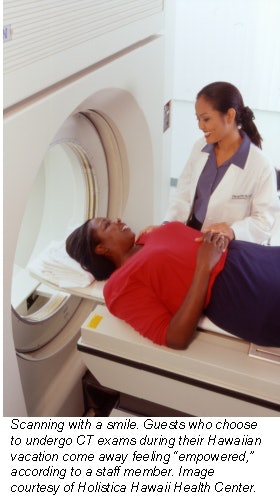 |
Resorts and spas are also jumping on the preventive medicine bandwagon. The Holistica Hawaii Health Center at the Hilton Hawaiian Village Beach Resort and Spa in Honolulu, installed an EBT scanner at its facilities last year, becoming the first in a resort setting.
The Greenbrier resort in White Sulphur Springs, WV, followed suit and recently installed an Imatron ultrafast CT scanner for cardiac screening at its West Virginia facilities. The resort also offers Doppler echocardiography and carotid artery imaging, with same-day results in most cases.
"We have saved lives and changed the way people view their health, which is our ultimate goal. Most feel empowered and in control when they leave the center and say they have peace of mind, especially if they have had a family medical history of a particular disease and discover they aren't at risk," said Robyn Schaefer, director of sales and marketing for the Holistica Hawaii Health Center.
Despite the mushrooming popularity of whole-body CT centers, Stanley warns that the scans are a low-yield endeavor. Only two or three cases of cancer may be detected when looking for every cancer in several hundred healthy people, he said.
"In my opinion, based on epidemiological data, a fraction of 1% of asymptomatic adults may ultimately benefit from these 'whole-body CT scans,' performed without the significant additive role of intravenous contrast media. The 99% of healthy adults, who are not benefited, may actually be harmed by being subjected to the diagnostic pursuit of inconsequential findings," said Stanley, who also is the chairman of the department of radiology at the University of Alabama in Birmingham.
Another problem is that false positives may appear on the scans that aren't indicative of any disease. The discovery of a lesion or benign mass could set individuals on a treadmill of expensive follow-up tests and invasive procedures, only for them to discover there is nothing wrong.
"Healthy, asymptomatic adults are being referred to specialists for future evaluation -- evaluation that may include biopsies or other invasive procedures. The Wall Street Journal reported that one California whole-body CT screening salon referred about 80% of its 'patients' to specialists. What this means is that too many people are being referred for trivial and inconsequential findings," Stanley said.
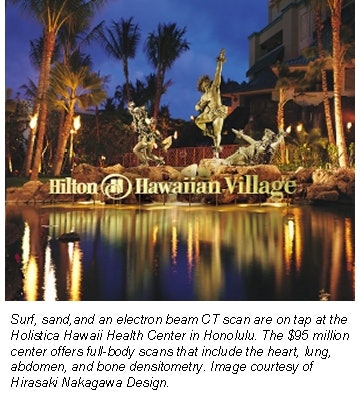 |
On the other hand, a clean scan could lull people into a false sense of security and lead them to ignore symptoms when they do appear. A full-body scan should not be considered a replacement for doctor visits and regular screening tests.
"The likelihood of detecting a significant disease, [i.e., an illness that will affect the person’s quality of life or mortality] is negligibly low. Whole-body CT scans, performed without intravenous contrast media, can miss a host of lesions, which may be significant. The greatest harm comes from the conversion of healthy adults into worried patients, unnecessarily being studied and probed rather than [treated for] the possible diseases [the scans] don’t detect," Stanley said.
Finally, radiation dose is still a controversial issue. In May, the FDA questioned the justification for exposing the public to risky levels of radiation at boutique clinics, especially because the exams are not diagnostic but are merely for routine health screening.
According to one analysis at Upstate Medical University in Syracuse, NY, a two-view chest x-ray results in an effective dose of 5 mrem to the patient. The dosage for a two-view mammogram is about 20 mrem. The dose for a whole-body scan could be as high as 1,000 mrem.
Dr. Thomas Shope, a special assistant at the FDA’s Center for Devices and Radiological Health, told the FDA panel that the average whole-body CT scan delivered 0.2 to 2.0 rads" (Reuters Health, May 18, 2001).
Dr. Harvey Eisenberg, founder of the Healthview Center for Preventative Medicine in Newport Beach, CA, said in an interview with USA Today that the country's approach to medicine should be shifted from reactive to proactive. He says by the time traditional medicine diagnoses diseases, it is a matter of catching up and recovering lost ground. With full-body CT scans, Eisenberg says serious diseases can be detected early, placing time on the side of patients.
"Large-scale screening always raises the question of cost-effectiveness, but the necessity to do large-scale screening is dictated by the fact that most diseases that kill people, like strokes and cancer, don't produce symptoms prior to a major life-threatening event. The more accurate your screening test and the more comprehensive, the more cost-effective it becomes. We currently consider ourselves extremely cost-effective," Eisenberg told USA Today (August 25, 2000). Eisenberg did not respond to AuntMinnie.com’s requests for an interview.
But Stanley said he has not seen evidence or hard data to justify Eisenberg's claims that full-body scans are effective tools for improving the health of the general population.
Offering so-called whole-body CT scans to healthy people who can afford them is simply wrong. It is bad medicine. While it might motivate someone who is told that his or her aorta contains calcification in its wall, the information itself is of little measurable value," Stanley said. "We don’t need a whole-body CT scan to tell us that we need to take care of ourselves. Changing to healthier lifestyles, such as quitting smoking, moderating alcohol and food consumption, and getting more exercise would do vastly more good than choosing a whole-body CT scan."
The high price of good health
Carrie Becks, medical advisor for Fireball Imaging in El Segundo, CA, said research on the benefits of whole-body CT screening is ongoing. Fireball Imaging specializes in helping hospitals and companies launch and set up whole-body screening centers through on-site training and marketing seminars by staff radiologists and marketing professionals.
"The evidence is still being developed and researched, but we're seeing benefits. We are finding about 15% of the asymptomatic patients scanned have significant diseases. It has proven better than a yearly physical exam," Becks said.
Another issue is the expense of full-body scans. Insurance companies rarely cover the cost of the tests unless individuals are referred by physicians, which means many of the visitors to these centers are footing the bill out of their pockets. The price tag for a single scan can range from $500 to more than $1,000. At The Greenbrier, for example, the five-day Spa/Clinic package can set a couple back $9,500.
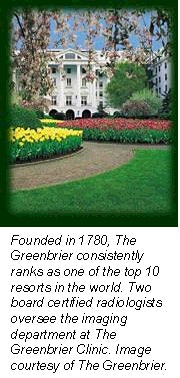 |
Becks said that clients of full-body screening centers are fully informed of both the costs and the potential drawbacks of the test. Armed with the knowledge of what's happening inside them, clients often leave the centers feeling more empowered and in control of their health, Becks said.
"None of the patients are tricked or coerced, and the scans aren't performed without consent. They are given the facts through the telephone, e-mail, Web sites, and brochures. This is a patient's choice. They are making educated decisions about their health," Becks said. "The tests give them peace of mind and encourages them to change and improve their lifestyles. What [other] test do we have that has those benefits?"
While debate continues on the effectiveness of whole-body CT scans, Stanley said the people who run the scanning centers have a responsibility to evaluate the power of the information they provide and the impact it could have on the general public.
"The point is, what kind of information are you going to give them? Do you know what sort of information to give them? Or should you simply say you have one nodule in your lung, you have a bump in your kidney, your prostate looks pretty sorry, and about six other things because that's what they see when they do CT scans. The person who was feeling pretty well, was rather wealthy, and was able to afford the screening test is now a wreck," Stanley said. "While these CT screening salons are using very sophisticated technology, they are providing superficial information that could be misleading and anxiety-producing to the person who has been scanned."
By Jennifer LungAuntMinnie.com staff writer
September 11, 2001
Robert Bruce contributed to this story.
Related Reading
Whole-body CT scan center to open in Scottsdale, AZ, June 26, 2001
InsideTrac touts whole-body CT scans, May 22, 2001
FDA worried about radiation risk from whole-body CT for routine screening, May 18, 2001
New ARRS president cautions against turning ‘healthy people into sick people’, April 30, 2001
Copyright © 2001 AuntMinnie.com





